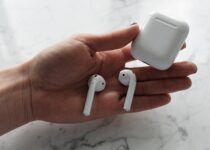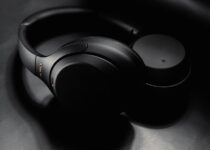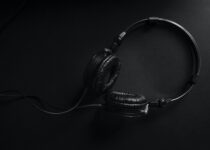Are iPhone 7 headphones waterproof?
Are you worried about using your iPhone 7 headphones in water? You’re not alone! With so much conflicting information out there, it’s hard to know what to believe. Well, the good news is that we’ve done the research for you, and we have the answer.
In short, the iPhone 7 headphones are not completely waterproof, but they are water-resistant. That means they can handle a bit of moisture, but they’re not designed to be submerged in water.
But what does that mean for you? Do you need to worry about using your headphones in the rain or at the beach? And what should you do if they do get wet?

In this article, we’ll dive deeply into clearing your doubt on “Are iPhone 7 headphones waterproof?”
Along with the difference of waterproof and water-resistance technology.
So, Let’s find out!
Waterproof technology and how it works:
Waterproof technology is a type of technology that is designed to prevent water from damaging electronic devices. This technology works by creating a barrier between the device’s internal components and the external environment.
The barrier is typically made up of materials that are impermeable to water, such as rubber, silicone, or plastic.
Now look at the difference of waterproof technology and water-resistant technology
Here before moving forward take a look at How to fix the headphone jack on iPhone 6?
Difference between waterproof technology and water-resistant technology
Waterproof and water-resistant technologies are both designed to protect devices from water damage, but there is a significant difference between the two.
Water-resistant technology refers to the ability of a device or material to resist the penetration of water to some degree.
This means that it can withstand exposure to water or moisture to some extent, but it is not completely impervious to water.
Water-resistant devices are typically rated using an IP (Ingress Protection) rating system, which measures the level of protection provided against the intrusion of water and other particles.
On the other hand, waterproof technology refers to the ability of a device or material to completely resist water penetration even when submerged in water for an extended period.
Waterproof devices are designed to be completely impervious to water, even when they are submerged.
This makes them ideal for use in activities such as swimming, snorkeling, and other water-related activities.
It’s important to note that while both technologies can protect devices from water damage, there is a significant difference in their level of protection.
Water-resistant devices can withstand exposure to water to some extent, but they can still be damaged if submerged for too long or exposed to high-pressure water.
Waterproof devices, on the other hand, are designed to withstand even the most extreme water conditions and can be used for extended periods of time underwater.
Taking a deeper look at the IP (Ingress Protection) rating will give you a clear idea about the level of water resistance of iPhone 7 headphones.
Now let’s see what is an IP rating?
What is an IP rating?
IP rating stands for Ingress Protection rating. It’s a two-digit code that indicates how resistant an electronic device is to dust and water. The rating is composed of two numbers.
An IP rating consists of two numbers that indicate the level of protection a device has against solid objects and liquids. The first number ranges from 0 to 6 and represents the device’s resistance to solid objects such as dust and dirt.

The second number ranges from 0 to 9 and represents the device’s resistance to liquids such as water.
For example, a device with an IP67 rating is completely dust-tight and can withstand immersion in water up to a depth of 1 meter for up to 30 minutes.
A device with an IP68 rating, on the other hand, is completely dust-tight and can withstand immersion in water up to a greater depth, such as 1.5 meters, for a longer period of time, such as up to 60 minutes.
Knowing a device’s IP rating is important when determining its suitability for use in different environments. A high IP rating would be ideal for devices that will be used in harsh environments, such as construction sites or marine environments.
What is the IP rating of iPhone 7 headphones?
The IP rating of iPhone 7 headphones is not explicitly mentioned by Apple, but it can be inferred from the IP rating of the iPhone 7 itself.
The iPhone 7 has an IP67 rating, which means it is completely dustproof and can withstand being submerged in water up to a depth of 1 meter for 30 minutes.
Are iPhone 7 headphones waterproof?
Now, let’s get to the main question – are iPhone 7 headphones waterproof? The short answer is no, they are not waterproof, but they do have a high level of water resistance.
As mentioned earlier, the headphones have an IP67 rating, which means they can withstand being submerged in water up to one meter deep for up to 30 minutes without getting damaged.
However, this does not mean that they are completely waterproof and can be used for swimming or diving activities.
It is important to note that while the headphones do have some level of water resistance, they are not completely waterproof and should not be submerged in water or used in extremely wet environments.
While they may be able to withstand light rain or accidental splashes of water, prolonged exposure to water can cause damage to the headphones and impact their performance.
Exposure to chemicals, high temperatures, or extreme pressure can also affect their water resistance. Therefore, it’s recommended to take proper care of the headphones and avoid exposing them to any conditions that could damage them.
3 Hidden Tips to Keep Your Headphones Safe
Now that we’ve established that the iPhone 7 headphones are not entirely waterproof, it’s essential to take some precautions to keep them safe. Here are some useful tips:

- Avoid Submerging Them in Water: As we mentioned earlier, the headphones can only withstand immersion in water up to one meter deep for up to 30 minutes. So, avoid exposing them to any liquid that can submerge them for an extended period.
- Dry Them Properly: If your headphones get wet, make sure you dry them thoroughly before using them again. Use a dry cloth or towel to wipe them down and then let them air dry for some time.
- Use a Protective Case: Investing in a protective case for your iPhone 7 headphones is always a good idea. Not only will it protect them from water damage, but it will also keep them safe from scratches and other forms of damage.
Frequently asked questions
Are iPhone headphones waterproof?
The iPhone headphones are not explicitly marketed as waterproof by Apple. However, they do have some level of water resistance due to their design and construction.
Is the iPhone 7 waterproof?
The iPhone 7 is not entirely waterproof, but it does have a high level of water resistance. It has an IP67 rating, which means it can withstand being submerged in water up to one meter deep for up to 30 minutes without getting damaged.
However, it’s important to note that the water resistance of the device can deteriorate over time, especially if it’s not properly maintained.
Is Apple wired earphones waterproof?
The standard Apple wired earphones are not waterproof, but they do have some level of water resistance. They can withstand sweat or accidental splashes of water, but they should not be submerged in water.
However, Apple does offer some waterproof earphone models like the AirPods Pro.
What happens if my Apple earphones get wet?
If your Apple earphones get wet, it’s important to dry them as soon as possible to prevent any damage. Wipe them with a dry cloth and let them air dry completely before using them again.
If they are not properly dried, the water can cause damage to the internal components and affect their performance. If the earphones are still not working properly after drying them, it’s recommended to contact Apple support for assistance.
Conclusion:
In conclusion, the answer to the question “are iPhone 7 headphones waterproof?“ is that they are not, they are only water-resistant, with an IP67 rating.
You can use them in light rain or accidental spills, but you should avoid submerging them in water or exposing them to heavy rain or any other liquid for an extended period.
We hope you found this article helpful and informative. If you have any further questions or comments, please feel free to share them with us.
And if you found this article useful, don’t forget to share it with your friends and family who may find it helpful as well. Your support and feedback mean a lot to us.



